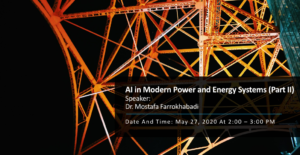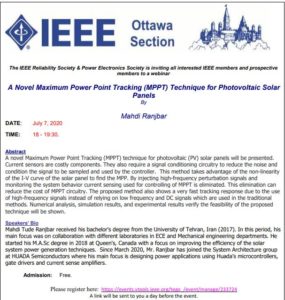Events
Presented by IEEE MTT-S Distinguished Microwave Lecturer (DML) Talks:
Transceiver Architectures for Beyond-5G: Challenges and R&D Opportunities, co-organized with SSC-S
By
Dr. Payam Heydari
University of California, Irvine
Date: Thursday, May 14 , 2020
Time: 12:00 PMÂ – 1 PM
Abstract:
The ongoing super-linear growth of world’s population coupled with the worldwide access to internet and the general public’s tendency to use more bandwidth-intensive applications fuel the urgency to enhance wireless infrastructures so as to meet these demands. Consequently, the wireless R&D is headed towards the inception of “Beyond-5G” (e.g., 6G) technology. This webinar provides a comprehensive overview of challenges and opportunities in designing beyond-5G transceiver architectures capable of achieving high data rates above and beyond 20 Gbps.Â
                                 Speaker Bio:
Payam Heydari received his Ph.D. degree from the University of Southern California in 2001. He is currently a Full Professor of Electrical Engineering at the University of California, Irvine. Dr. Heydari’s research covers the design of terahertz/millimeter-wave/RF and analog integrated circuits. He is the (co)-author of two books, one book chapter, and more than 150 journal and conference papers.Â
Dr. Heydari is an AdCom member of the IEEE Solid-State Circuits Society. Dr. Heydari currently serves an Associate Editor for the IEEE Journal of Solid-State Circuits and the IEEE Solid-State Circuits Letters. He was a member of the Technical Program Committee of the International Solid-State Circuits Conference (ISSCC). Dr. Heydari is an IEEE Fellow for contributions to silicon-based millimeter-wave integrated circuits and systems.
Â
        Event is free, but space is limited.  All participants must register in advance. For                         Registration: please use the following link

This seminar discusses the use of AI in modern power and energy systems, in particular electrical distribution networks.
About this Event
Driven by global environmental emission issues and tighter
requirements for system resilience and reliability, electricity
production is shifting from a centralized paradigm to a decentralized
one. In this context, renewable energy sources (RES) and electric
vehicles (EVs) have proliferated over the past decade, exhibiting a
steadily increasing trend. Thus, today, a large number of wind turbines,
photovoltaic (PV) panels, and EVs are connected to medium- (1-69 kV)
and low-voltage (=1 kV) grids, with traditional integrated bulk power
systems becoming decentralized in the presence of active distribution
networks, where the flow of power is bidirectional between generators
and “prosumers”. Such systems are typified by a high penetration of
metering infrastructures, generating a large volume of data, providing
the opportunity to harness the power of big data using data-driven
techniques.
This seminar discusses the use of artificial
intelligence (AI) in modern power and energy systems, in particular
electrical distribution networks. Real-world examples of the use of AI
for energy storage systems optimization and control will be provided and
discussed.
Key Focus
- What are modern power systems control and optimization issues?
- How data-driven techniques can help?
- What is the state-of-the-art?
- What is the path forward?
Admission is FREE! Everyone is welcome! Registration is required!
BIOGRAPHY:
Dr.
Mostafa Farrokhabadi is the Senior Director of Technology at
BluWave-ai. Concurrently, he serves as Associate Editor of IEEE
Transactions on Smart Grid. He has more than 8 years of experience in
designing mission critical grid solutions for industry and academia,
including technical leadership of a $6M international consortium in
electric grid modernization, and smart grids projects with Hatch and
Canadian Solar. Mostafa has (co)authored several articles in high-impact
journals, conference proceedings, and magazines, and holds patents on
intelligent control and optimization of renewable-penetrated grids.
Mostafa has also led the award-winning IEEE Power and Energy Society
Task Force on microgrid stability, an international coalition of 21
researchers from 14 institutions investigating stability issues in
microgrids. Mostafa obtained his PhD in Electrical and Computer
Engineering from the University of Waterloo. He has also studied and
performed research in Sweden at KTH and Germany at KIT. During the
course of his career, Mostafa has received multiple business, research,
and teaching awards, including the prestigious University of Waterloo
Doctoral Thesis Completion Award and Ottawa’s Forty Under 40.

The virtual series of IEEE Women in Engineering International Leadership Conference (WIE ILC) 2020.
The IEEE WIE ILC Virtual Series will take place throughout June 2020,
offering 1-hour sessions, live panel discussions, virtual networking
opportunities, and an on-demand library for you to browse when it’s
convenient for you. Registration is free!
Visit http://ieee-wie-ilc.org/virtual2020/ for more information.
#IEEEWIE

Presented by the IEEE Ottawa Section MTT-S/AP-S Chapter & Young ProfessionalsÂ
Accelerating 5G Design Innovation Through SimulationÂ
                                  By
Dr. Laila SalmanÂ
                               Ansys Inc.
                     Date: Wednesday, June 10, 2020
                        Time: 2:30 PM – 4:00 PM
                                  Location: Online
           Â
Abstract
5G connectivity is the next technological revolution. This pervasive, ultrafast compute network will connect billions of devices with data on-demand. It will drive economic expansion in many sectors, spawn new products and services, and transform our lives as we know it. Yet, before 5G can deliver on its promises and quality of service (QoS) metrics, wireless systems designers and engineers must overcome sizable challenges. Â
Ansys 5G simulation solutions empower these individuals to solve the complexities impeding device, network and data center design. Ansys 5G simulation solutions provide electromagnetics, semiconductor, electronics cooling and mechanical analysis tools to accurately simulate 5G radio and related technologies. The multi-solution platform leverages high-performance computing that can be deployed across the enterprise, allowing designers and engineering experts to collaborate more effectively.Â
This seminar will highlight the following 5G engineering challenges:Â
·  End User Equipment Â
  o  multi-frequency band antenna integrationÂ
  o   modeling of mm-wave array antennas Â
  o   RFI, EMI & Desense MitigationÂ
·  Base-Station Antenna ModelingÂ
  o  Full Communication Analysis in Electrically Large & Complex EnvironmentÂ
  o  RFI, Data Coverage & ElectroThermal ReliabilityÂ
Speaker Bio
Dr. Laila Salman received the B.S. and M.S. degrees in electronics and communication engineering from Cairo University, Egypt, and the PhD. Degree in electromagnetic and antenna design from the University of Mississippi. She also worked as a post-doctoral student at the Université de Quebec en Outaouais, Gatineau, Canada till 2010. Her research was on dielectric resonator antennas, wearable antennas, microwave and millimeter-wave circuits and systems, microwave imaging for early detection of breast cancer and scattering from left-handed metamaterials. Dr. Salman joined Ansys Canada Ltd. in August 2010 as a Lead Technical Services Specialist for High Frequency Applications.
Registration: Please use the link in the registration section to sign up for the event.
To join event use the following link.

|
The IEEE Reliability Society & Power Electronics  A Novel Maximum Power Point Tracking (MPPT) Technique for Photovoltaic Solar Panels By  Mahdi Ranjbar DATE:      July 7, 2020 TIME:       18 – 19:30.     A  Mahdi
A link will be sent to you a day before the event. Â |

